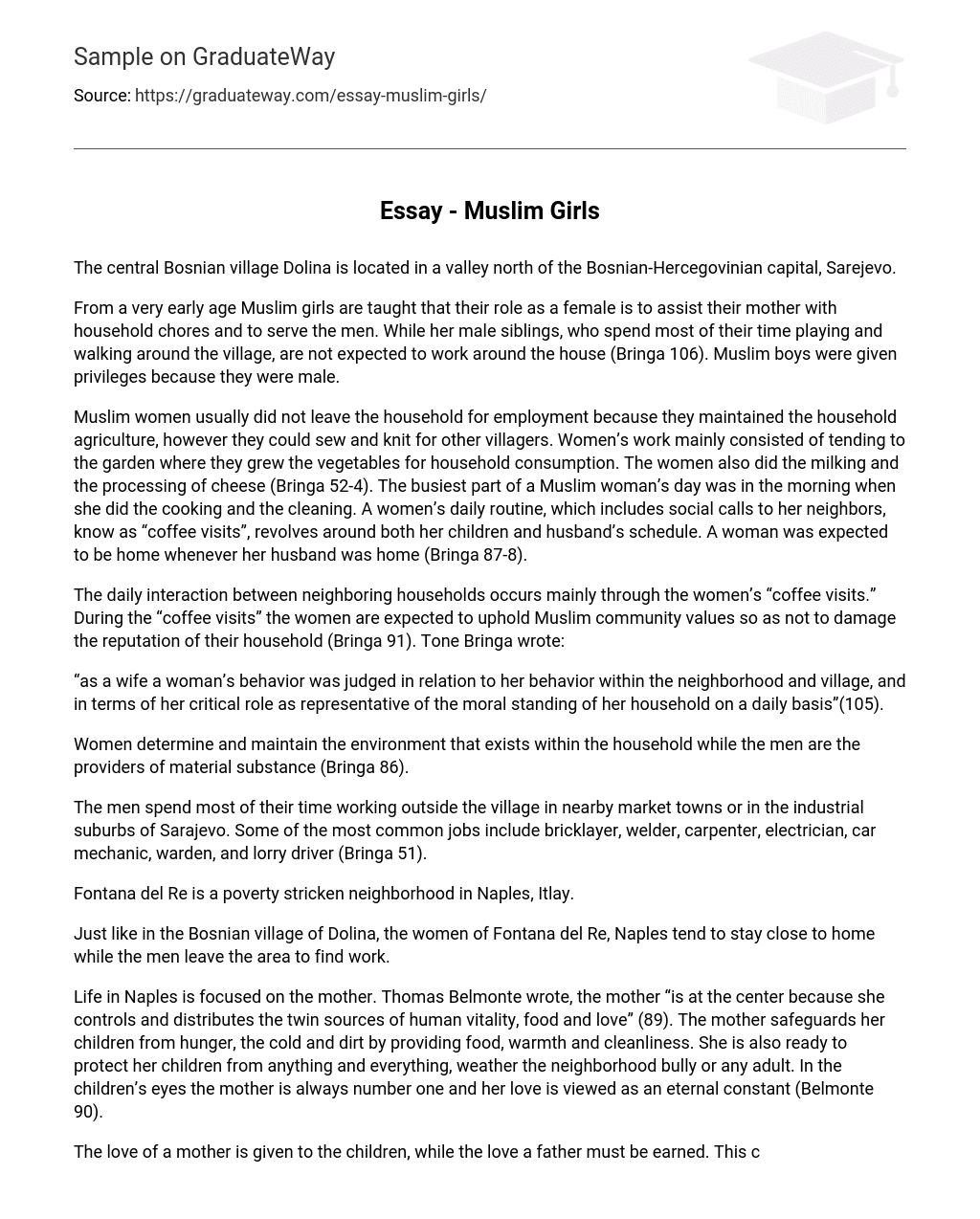The village Dolina is situated in a valley to the north of the Bosnian-Herzegovinian capital, Sarajevo.
From a young age, Muslim girls are taught that their duty as females is to help their mothers with household chores and serve the men. In contrast, their male siblings have the freedom to play and roam while not being obligated to contribute to household tasks (Bringa 106). The preference for boys in the Muslim community grants them certain privileges by virtue of their gender.
Muslim women traditionally focused on household responsibilities and agricultural work rather than seeking employment outside the home. However, they did have the ability to sew and knit for their fellow villagers. Their tasks primarily involved caring for the household garden and growing vegetables for family consumption. Additionally, they were responsible for milking cows and producing cheese. The most hectic time of day for Muslim women was the morning, when they prepared meals and performed cleaning duties. Their daily routine, including visiting neighbors for coffee, revolved around the schedules of their children and husbands. It was expected that a woman would be at home whenever her husband was present.
According to Tone Bringa, the daily interaction between neighboring households is primarily through the women’s “coffee visits.” This practice has the expectation that women uphold Muslim community values in order to maintain the reputation of their household (Bringa 91).
“As a wife, a woman’s conduct was evaluated based on her behavior within the neighborhood and village. Additionally, her actions were considered crucial in representing the moral reputation of her household each day.”
According to Bringa (86), women are responsible for establishing and upholding the household environment, while men serve as providers of material resources.
According to Bringa (51), the men primarily work outside the village in nearby market towns or industrial suburbs of Sarajevo. Common occupations include bricklayer, welder, carpenter, electrician, car mechanic, warden, and lorry driver.
Fontana del Re is a deprived area in Naples, Italy.
Similarly, in the village of Dolina in Bosnia and the Fontana del Re in Naples, the women often remain near their homes while the men venture out to seek employment.
Thomas Belmonte emphasizes the important role of mothers in Naples, as they take care of two crucial aspects of human life: nourishment and affection (89). Mothers ensure that their children are safeguarded from hunger, harsh weather conditions, and lack of hygiene by providing them with food, warmth, and cleanliness. Additionally, they act as protectors for their children against potential threats such as bullies or other adults. According to the perspective of the children themselves, their mother holds a primary position in their lives and they perceive her love as an everlasting force (Belmonte 90).
The love of a mother is bestowed upon children, whereas the love of a father must be earned. This separation of emotions leads to fathers taking on the role of disciplinarians. Consequently, children are more afraid of their father than their mother (Belmonte 91).
The mother tirelessly takes care of her family without expecting any special recognition for her hard work, while the father consistently reminds his children of the sacrifices he has made throughout the years. The mother is the binding force that keeps the family united (Belmonte 90).
According to Belmonte, women play a crucial role in society by fulfilling important responsibilities while men are either working or seeking employment.
According to the author, Italian women did not conform to the stereotype of being submissive and obedient wives. They refused to remain in the background and were not confined within the walls of their homes. Instead, these women displayed a rebellious spirit and were willing to question and oppose the decisions made by men, as long as they deemed them to be unwise (92).
If the family faced financial difficulties, the mother would take up temporary employment to contribute towards meeting their needs. However, once the family’s situation improved, the mother would cease working (Belmonte 92).





